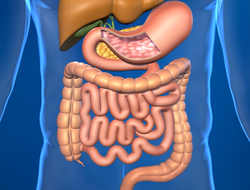Inflammatory Bowel disease, irritable bowel syndrome and nutrition.
Published: December 14, 2018
Inflammatory bowel diseases (IBD) and irritable bowel syndrome (IBS) while affecting your lower gastrointestinal tract and having several common symptoms are distinct physiological conditions.
IBD refers to conditions such as ulcerative colitis and Crohn’s disease which is also known as regional enteritis.
IBS is defined as an intestinal disorder of unknown causes and may be difficult to identify.
Both conditions vary between individuals and there is no single medical or nutrition therapy for either of the conditions.
Individuals who have been diagnosed with IBD or IBS need to work closely with their health care provider(s) to establish a treatment protocol that provides relief and reduces their risk of acute events.
This article provides an overview of IBD and IBS, and treatment protocols. Should you identify with the symptoms of IBD or IBS it is imperative that you seek professional medical help to determine your condition and identify a supportive treatment protocol.
Inflammatory Bowel Diseases
Ulcerative colitis is an inflammatory disease of the mucosa of your colon.
Mucosa refers to the layers of mucous membranes which line internal organs of your body and which may secrete protective mucus.
Inflammation may extend from your rectum into your colon, and small ulcers may develop.
This condition is associated with an increased risk of cancer in the long term.
Removal of the rectum and the creation of an ileal pouch or ileoanal anastomosis (the surgical construction of an internal reservoir which takes the place of the rectum) may be required.
Crohn’s disease is identified by chronic granulomatous inflammation of your lower gastrointestinal tract (GI tract) which can be acute, relapsing or chronic.
Inflammation affects all layers of mucosa and results in diarrhea, strictures, fistulas, and nutrient malabsorption.
As ulcerated abscesses and fistulas, which form during acute bouts of inflammation, are resolved, submucosal thickening (fibrosis) and scarring occurs which has the potential to lead to localised narrowing of your intestine.
This in turn can lead to partial of complete obstruction of your lower intestine. In some instances surgical resection is required.
IBD primarily affects individuals between 15-30 years of age, but can develop later in life.
The exact cause of IBD is not yet fully understood, but several factors may together contribute to the development of an IBD. Several potential causal factors include:...link to the full article to learn more.
References
1.
Beyer, P. (2004). Medical Nutrition Therapy for Lower Gastrointestinal Tract Disorders. In Mann. K. & Escott-Stump, S. (Eds.)(2004). Krause's Food, Nutrition & Diet Therapy. (11th Ed.) Elsevier
2.
Whitney, E. & Rady Rolfes, S. (2005). Understanding Nutrition. Belmont, CA: Thomson Wadsworth
3.
Gropper, S.S., Smith, J.L. & Groff, J.L. (2005). Advanced Nutrition and Human Metabolism (4thEd.). Belmont, CA: Thomson Wadsworth.
4.
Center for Science in the Public Interest. Nutrition Action Health LetterApril (January?February, 2013)

